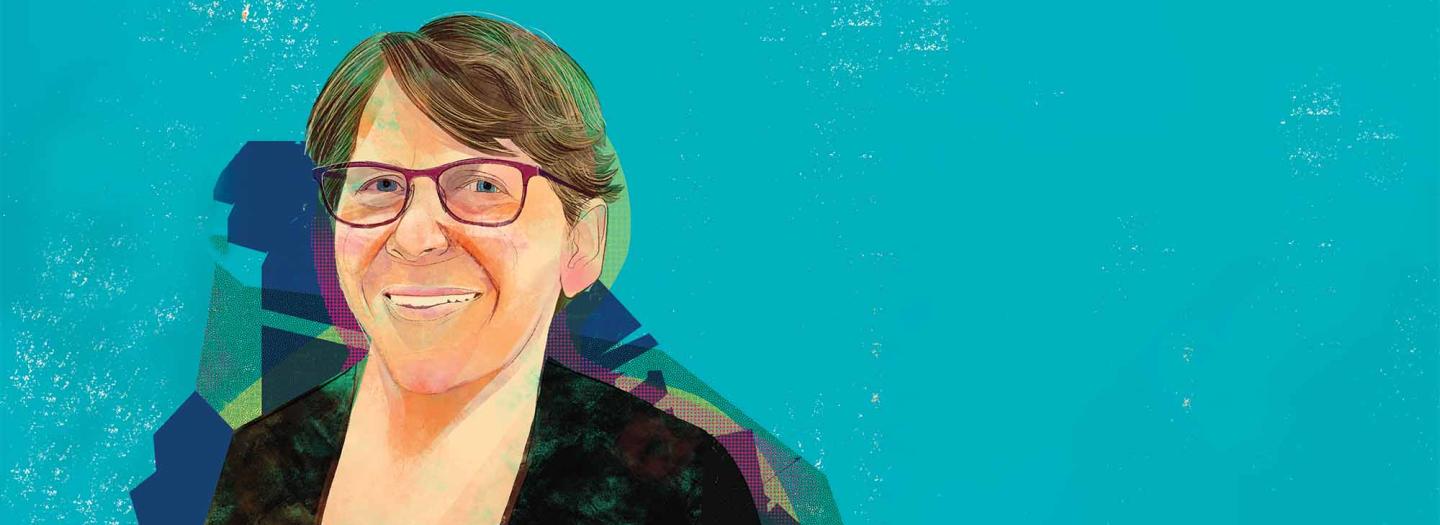Naomi Schapiro, MS ’96, PhD ’12, PNP : An inspiring mentor and compassionate advocate for young people
The UCSF Nursing Alumni Association Board of Directors is honored to announce the 2023 Jane Norbeck Distinguished Service Award recipient: Naomi Schapiro, MS ’96, PhD ’12, PNP.

An accident when she was a teenager changed the life of Naomi Schapiro, MS ’96, PhD ’12, PNP, steering her toward a career as a nurse, mentor, and teacher in service to others, especially teens.
Now the UCSF School of Nursing Alumni Association is honoring Schapiro with the 2023 Jane Norbeck Distinguished Service Award.
A protégé who nominated Schapiro for the award called her an incredible advocate and mentor. “Naomi’s deep devotion to improving care for the underserved, and her incredible persuasiveness in enlisting mentees to address clinical or educational gaps, always propel me to think outside of my own comfort zone and to join her in these efforts,” the nominator wrote.
In response to this honor, Schapiro expressed surprise and delight. “It came out of the blue,” she says.
Nurses Leave a Lasting Impression
At age 17, about to graduate from high school and with an acceptance to Harvard University, Schapiro, her 14-year-old sister, and their parents were in a single-car accident on the way to their home in Croton-on-Hudson, New York.
Schapiro suffered a fractured vertebra, broken arm, and internal injuries. Her sister, Susan, also fractured a vertebra and became paraplegic. Although the sisters were initially hospitalized together, Susan went on to spend six months in a rehabilitation facility 30 miles from home. Their parents, also severely injured, were physically and emotionally unavailable.
“People didn’t give either of us very much information about what was going on,” she says. “It was really the nurses who helped me and my sister through what had happened.”
Schapiro made it to Harvard as planned but dropped out after becoming involved in protests against the war in Vietnam. She had developed a sense of social justice and found herself wanting to do something useful for the world. Soon, she took a job as a nursing home aide.
“I realized I really liked the interactions that nurses get to have with patients,” she says. Seeing her life path more clearly, she enrolled in a nursing program in New York City.
Her first postgraduate nursing roles were at community hospitals in Cambridge and Boston. Then, in 1980, she moved to the Bay Area, where her sister, whose life was also transformed by the car accident, had attended UC Berkeley Law School and was involved in disability rights.
For a while, Schapiro pursued another great passion: music. She played flute and saxophone in an all-women jazz band with a political bent. Called Swingshift, the band played around the city and toured. To pay the bills, Schapiro worked registry and per diem nursing positions, including stints at UCSF hospitals.
When she realized that she wasn’t going to be a world-class musician, she leaned into nursing with renewed determination.
Helping Teens, with Skill and Empathy
Among her roles at UCSF was conducting forensic medical and psychological evaluations of child sexual abuse survivors at what is now the Child and Adolescent Support Advocacy and Resource Center (CASARC) at Zuckerberg San Francisco General Hospital. And she spent evenings and weekends working at juvenile hall.
“I totally fell in love with working with teenagers,” she says. “That’s been my focus ever since.”
She decided to become a nurse practitioner and ultimately to teach at UCSF – but also had a burgeoning family. Her partner, Kimi, who was earning a master of public health degree at UC Berkeley, had a young daughter, and the couple – who have now been together for 35 years – soon welcomed another daughter.
“I feel really fortunate that at UCSF I could have the flexibility to teach part-time while we had young children,” Schapiro says. “They gave me some space to craft my work so I could focus on school-based health with teenagers, where my heart is.”
She earned a master’s degree and later a PhD from UCSF and began working with teenage immigrants from El Salvador, Guatemala, and Mexico in the city’s clinics, including UCSF’s Valencia Health Services and La Clínica de la Raza. Many of these young people had spent years separated from their parents, who had come to the U.S. to work and establish new lives before bringing their children across the border.
Having experienced her own traumatic family separations, Schapiro has profound empathy for immigrant youth. It was an understudied population that became the focus of her clinical work and research.
“On some deep level, it resonated with my own experiences,” Schapiro says. “Even though they weren’t my own or my family’s immigration experiences, they had a similar separation and reunification that had lasting emotional effects.”
She spoke increasingly fluent Spanish and made continual discoveries about the best ways to earn the teens’ trust, document their experiences, and help these young people with the adjustment to their new lives.
She also assisted many teens in learning about careers in health care and becoming paid “patient actors” to help train future clinicians. Many of these young people have gone on to study for health care careers as physicians and nurses.
Schapiro, who retired in 2019, now guest lectures, trains community providers, mentors clinicians and junior faculty, and co-chairs a suicide prevention initiative for the National Association of Pediatric Nurse Practitioners.
In addition, she is enjoying spending time with her young granddaughter. “Now it’s time for lots of grandma care,” she says.